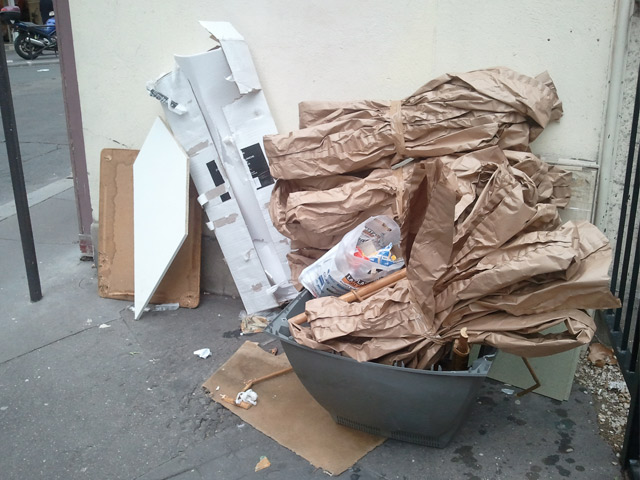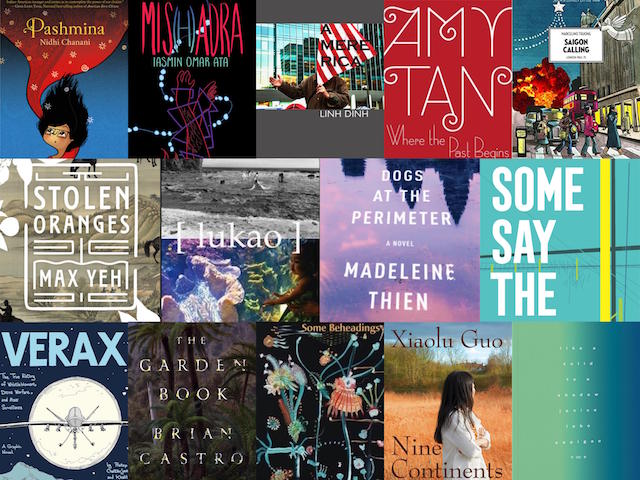Wading through piles of litter, trying to reclaim a car, object relations, lobsters, and more.

October 7, 2016
Take part in this week’s link roundup as we consider all the things that we pick up and discard. If you’ve ever wondered about what it is to own, whether it’s a culture, a car, a memory, an accent, this lineup is for you. Join us as we think about what’s valuable, what’s disposable, and what we do with the space in between. Pick up your digital gadget of choice and settle in for a weekend reading about having stuff.
The Art Of Cleaning And The Tragedy Of Mess by William C. Anderson
William C. Anderson reflects on Mierle Laderman Ukeles’s body of work and Black communities’ and people’s entangled history with janitorial labor, servicework, and sanitation, for Contemptorary.
Whether it was in the house, field, mine, factory, or elsewhere, Black people have often been seen merely as bodies and receptacles to perform unrelenting messy jobs. We have been viewed as receptacles to receive burdensome labor deemed too unsavory for those who often view Black skin like something dirty or unclean itself. I grew up doing this work just like my ancestors, and to this day, I still do it regularly. I am a janitor. Cleaning up after people is not undignified work. It’s hard and often unsightly, but not undignified. The way cleaning people are treated as disposable is what’s undignified. And we carry the weight of both of these reasonings.
Content warning for the following piece for dissociation.
Bookforum talks with Alexandra Kleeman by Anelise Chen
AAWW pals Anelise Chen and Alexandra Kleeman discuss fantasies and fears of womanhood, banality, and lobsters, for Bookforum. (Watch Chen and Kleeman in another conversation, this time with Patricia Park in a two-part video series from our Heroine vs. City event!)
I like menace, dread, and fear because they’re all feelings that involve a heightened sensitivity to your surroundings. The only time you aren’t feeling strange or oversensitive or menaced is when you’re closing off part of the world to yourself, artificially streamlining or simplifying. When you’re afraid, you suddenly become aware of how many things can possibly happen to you, and how little you actually know.
When I was plotting some of these stories, I was interested in starting from fear and seeing where else you could end up emotionally without resolving the thing that caused the fear. That’s really interesting to me. I can imagine a full story arc, but I’m more interested in beginning with an unsolvable problem and figuring out some way to continue on from there.
For Filipina/x-Americans Who See Themselves Thru Anthony Bourdain by Janice Lobo Sapigao
In this poetry piece on the Offing, Janice Lobo Sapigao cuts into and splices together relations of American occupation of the Philippines, food tourism, and Anthony Bourdain.
The thousand pieces of a broken plate
cannot come together with Elmer’s.
Any Uncle Sam in an Aloha button-up shirt
with rolled-up sleeves to deal with humidity
and a spoon and fork as hands
can call us generous. Name us resilient.
Jolly their ways to our pigs.
Play exotic Jingle Bells
and other easy adjectives for Christmastime.
Content warning for the following piece for colorism.
On immigration and being an anomaly in two separate worlds by Kieran Yates
From The Good Immigrant, a collection of essays, Kieran Yates explores the complexity of language, lightening creams, and immigrant identity on The Pool.
I know that language can be painful, and so too do a generation of immigrants who have arrived here through different pathways. For them, language is the great battle to fight, and for many it’s a war you always feel like you’re losing. Even when you get the language, unless you shed your accent, you’re continually reminded of your difference. For Indians, our accent has almost become a universal in-joke. The Apu- thank-you-come-again novelty, the ingrained Western truth that ‘everything sounds funny with an Indian accent!’ is an imprint of cultural worth.
Inside the Chicago Police Department’s secret budget by Joel Handley
Joel Handley reports for the Chicago Reader on behind-closed-door financial dealings of the Chicago Police Department, which disproportionately affects poor communities through civil forfeiture of their possessions.
[T]he Reader has documented for the first time the full size and scope of CPD’s civil forfeiture program—how much money it brings in and how it spends its take. Through numerous Freedom of Information Act requests, the Reader, working with the Chicago-based transparency nonprofit Lucy Parsons Labs and the public records website MuckRock, obtained more than 1,000 pages of CPD documents—including the department’s deposit and expenditure ledgers, internal e-mails, and purchasing records—that offer an unprecedented look into how Chicago police and the Cook County state’s attorney’s office make lucrative use of civil asset forfeiture.
Rest in Power Grace Lee Boggs. 1915-2015 by the filmmakers of American Revolutionary: The Evolution of Grace Lee Boggs
In discarded snippets of footage from American Revolutionary: The Evolution of Grace Lee Boggs, documentary filmmakers offer a rare glimpse into the life of Grace Lee Boggs, a powerful author and activist, in commemoration of Boggs’ one-year death anniversary.
A short video made up of footage — most of which we weren’t able to use in American Revolutionary: The Evolution of Grace Lee Boggs.
Thanks for sharing.
#GraceLeeTaughtMe
#InLoveandStruggle
The Luke Cage Syllabus: A Breakdown of All the Black Literature Featured in Netflix’s Luke Cage by Tara Betts
In celebration of Luke Cage’s premiere, Tara Betts on Black Nerd Problems compiles the many Black literature texts that appear throughout the show, spanning topics like histories of medicalism and Blackness, Black barber shops, and community economies in Harlem.
In a scene in Pop’s Barber Shop, Luke debates with Pop and Bobby Fish about some of the more recent descendants of hard-boiled mysteries, including Black pulp fiction masters like Donald Goines and Chester Himes. During that conversation, Luke Cage clutches a copy of Walter Mosley’s Easy Rawlins’ mystery Little Green while Pop extols Goines’ character Kenyatta as one of the first Black radical literary heroes (the protagonist in four novels, Crime Partners, Death List, Kenyatta’s Escape, and Kenyatta’s Last Hit.) The beauty of these sorts of exchanges is not just that there are these moments of reveling in Blackness, but it also stresses how Black readers have a variety of influences and disciplines that they’re engaged by as readers. When Luke mentions George Pelecanos (novelist and writer on The Wire), Richard Price (author of Clockers), and Dennis Lehane (author of Mystic River), it’s only the beginning of what Luke and his fellow characters mention throughout the season. With those texts in mind, here are some others.
National Book Awards Finalists Include Colson Whitehead and Viet Thanh Nguyen by Alexandra Alter
Congratulations to the finalists for the National Book Awards, including some friends of the Workshop! Find them throughout our digital spaces, with Karan Mahajan reading from The Association of Small Bombs on our Facebook, Sharif celebrating the release of Look on AAWW TV, and Viet Thanh Nguyen reading an excerpt of The Sympathizer on AAWW TV as well as contending with history with Paul Tran on the Margins.
The 22 finalists, whom the National Book Foundation announced Thursday, include two Pulitzer Prize winners, two previous National Book Award winners and a poet making her debut. The winners will be announced on Nov. 16 at a gala in New York.
This year’s Literarian Award, for “outstanding service to literature,” will be awarded to Cave Canem, a writer’s center that has helped spur the careers of celebrated black poets and whose fellows have included Robin Coste Lewis, Ross Gay, Tracy K. Smith and Terrance Hayes. The lifetime achievement award will be presented to Robert A. Caro, author of “The Power Broker,” a biography of Robert Moses, and an ongoing multivolume biography of Lyndon B. Johnson.



